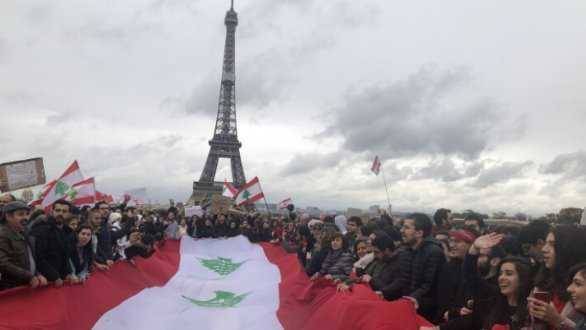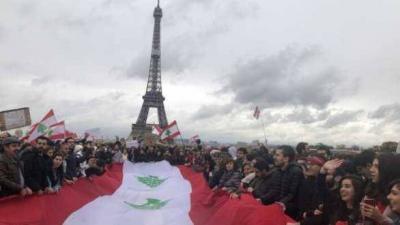The French presidency and foreign ministry are preparing for a meeting of advisors and foreign ministers from countries interested in Lebanon in early February. The countries participating in this meeting include the United States, France, and Saudi Arabia, along with Qatar and Egypt, which have expressed interest in the Lebanese issue and their desire to participate in the meeting. A high-ranking French source told "An-Nahar" that President Emmanuel Macron, as previously stated in his interview, will not allow the situation to deteriorate without taking action. The idea is that subsequent to the meeting, interested countries will be gathered, including European nations and Jordan, but not in the form of an international group concerning Lebanon. Instead, this would allow for mobilizing interested partners to pressure Lebanese officials who benefit from the dispersion of local positions for their own interests. Therefore, the meeting will not invite Lebanese participants, and it will expand later to elevate the level of participation. The first meeting will take place in early February and will then be expanded to a ministerial level to increase pressure and discuss the mechanisms available to participants and what can be done in this context. The French official clarified that the meetings will not only focus on the necessity of electing a president in Lebanon, which is important, but will also address everything happening and what movements can be made to exert pressure.
Regarding what President Macron said to "An-Nahar" about his discussions with the Jordanian king concerning supplying Lebanon with electricity, the official responded that France, along with the United States, contributed to reaching an agreement on maritime border demarcation with Israel, creating medium-term opportunities for energy in Lebanon, but not in the short term. For Lebanon's immediate needs, there are two projects strongly supported by France: supplying Lebanon with Egyptian gas via Jordan and Syria, and Paris is working on this. Lebanese authorities have taken steps that Paris considers progress requiring further completion, such as launching the National Energy Authority at France's request. However, actions regarding payments remain to be taken, and France is sending messages to the Lebanese government in this regard because before addressing the issue of bypassing the Caesar Act to pass through Syria, financing must be secured, necessitating that the government take minimum actions.
The official ruled out that the situation in Iran would affect Lebanon, stating that some Lebanese actors are seeking external responsibilities to maintain the current situation for their personal interests. He mentioned that the visit of the Iranian Foreign Minister to Beirut did not change anything. In this context, Foreign Minister Catherine Colonna called for overcoming the obstruction and electing a president for Lebanon without further delay, also demanding a transparent and independent investigation into the Beirut port explosion that is free from political interference and calling for accountability.
In response to a question in the French Senate, Colonna announced, "Lebanon is a country dear to France, and our goal is the well-being of the Lebanese people." She added, "We support it from a humanitarian and economic perspective." She reiterated, "Lebanese officials must overcome the current obstruction, and there must be a president for Lebanon, and they must elect it without further delay." Regarding the ongoing investigations by the European judicial delegation, she stated, "We carry the hopes of the Lebanese people for justice, but it is an ongoing judicial matter, so I will not comment on it." Regarding the investigation into the explosion at the Beirut port on August 4, 2020, Colonna stated, "It is a separate procedure, and it is essential to shed all light on this explosion that struck Beirut and caused many casualties." She continued, "As you know, Lebanon chose a national investigation, which is a sovereign choice, and France is still ready, as Lebanon knows, to provide the necessary assistance."
On another note, "Nidaa Al-Watan" pointed out that nothing indicates that Lebanon and its presidential entitlements have fallen off the international and Arab radar more than the developments surrounding the Paris meeting, which has been discussed as a quadripartite meeting dedicated to discussing the presidential file. In the true narrative of what has been circulated, France was the first to propose the idea to the Americans, and the advice was not to build hopes too high. The Saudis, after deliberation, preferred to confine discussions to humanitarian assistance. The French sensed a coldness in international and Arab engagement regarding presidential elections in Lebanon. The initiative that began preparation as a quadripartite meeting has transformed into a "Zoom" meeting, perhaps even a bilateral one, likely aimed more at humanitarian issues than political ones, and it will not produce anything connected to the presidency.
Currently, there are two sources of international concern regarding Lebanon: the stagnation in presidential elections and financial sanctions on Lebanese figures. Despite the Americans refraining from intervening and Saudi indifference to directly engaging in Lebanese political affairs, Lebanon remains under scrutiny. International reports indicate that the current situation, characterized by local mismanagement and the Parliament's inability to agree on a president, is a source of international concern. Only France is seeking to break the deadlock, but its efforts are contingent upon American conditions and confined by a lack of Saudi desire.
There is a common Western, European, and American belief that "Hezbollah" is preventing the presidential elections in Lebanon. Reports from abroad go so far as to consider the nomination of "Marada Movement" leader Sleiman Frangieh linked to Hezbollah's desire to elect a president associated with it. Therefore, there are echoes in international circles that Frangieh's candidacy is likely to be rejected internationally and Arab-wise, with some countries advising against clinging to this choice and betting on time, considering that the current parliament, dominated by both factions, is incapable of electing a president, whether affiliated with one faction or another. These countries emphasize the necessity of agreeing on the election of a candidate that can find consensus.
Contrary to all adversity, the Western and Arab environment has not shown evidence of supporting the nomination of Army Commander Joseph Aoun. His candidacy, in their view, still lacks support from any parliamentary bloc, and there is no one endorsing him in a way that shows support for other candidates, whether in secret or in public. To this day, well-informed diplomatic sources confirm that no candidate names are being circulated, and there is no candidate supported by the U.S., France, or Saudi Arabia. The external approach does not involve naming candidates as much as it cares about electing a president as quickly as possible. The outside world is closely monitoring the political process connected to the presidency, with its eyes on "Hezbollah," which it sees as a primary suspect in the obstruction.
Related to the anticipated Paris meeting, informed diplomatic sources downplayed the significance of the meeting to the point of draining it of any political value concerning the presidential elections in Lebanon, stating that each participating country or those discussed to participate aims to achieve a different goal from others. The meeting prepared to be a consultative meeting at the level of foreign affairs advisors and ambassadors may be replaced by a "Zoom" meeting, limited to three countries instead of four, and will have a humanitarian, not a political, character. The U.S. focuses on discussing the possibility and means of continuing support for the Lebanese army, a file it still prioritizes over others, indicating that it remains indifferent to the Lebanese presidential file. Meanwhile, Saudi Arabia aims to revisit the possibility of assistance to Lebanon through a support fund, while France wishes to engage Qatar based on the potential for offering aid to rescue Lebanon from its financial and economic crisis. Saudi Arabia does not object to Qatar's participation, but it conditioned that the objective is within the ongoing discussions about assisting Lebanon and not involving the political matter, which will not be presented in its direct form.
The same countries — the U.S., France, and Saudi Arabia — are still in ongoing discussions to reach a final concept on how to convene the meeting and its intended purpose, while circles have expressed skepticism about the discussed dates for its occurrence, stating that all discussions are ongoing in detail without ruling out the possibility of resulting in bilateral meetings at the advisor level. Regardless of the formats, it is certain that the presidential entitlement will not be the main agenda of the consultants, and Lebanon remains in an international limbo.




